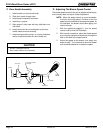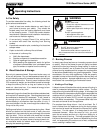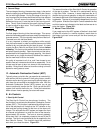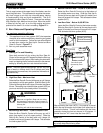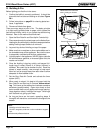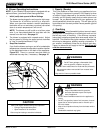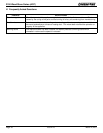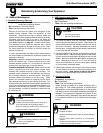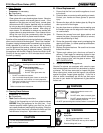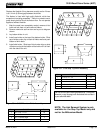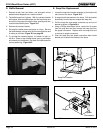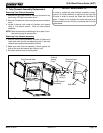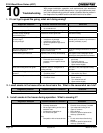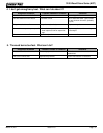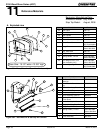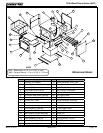
Page 32
7033-277C
March 2, 2007
R
3100 Wood Stove Series (ACC)
5. Cleaning Plated Surfaces
• Frequency: As necessary
• By: Homeowner
• Task: See the following instructions.
Clean all the fi ngerprints and oils from plated surfaces
BEFORE fi ring the appliance for the fi rst time. If not
cleaned properly before lighting your fi rst fi re, the oils
can cause permanent markings on the plating. After the
plating is cured, the oils will not affect the fi nish and little
maintenance is required. Wipe clean as needed.
B. Glass Replacement
1. Ensure that the fi re is out and the appliance is cool
to the touch.
2. Protect a table or counter top with padding or towels.
Protect your hands and wear gloves to prevent
injury.
3. Remove the door with the broken glass by lifting the
door up and off of the hinges.
4.
Lay door face down on a table or counter making sure
the handle hangs over the edge so the door lays fl at,
on a soft surface.
5. Remove the screws from each glass retainer and
remove the glass. (If screws are diffi cult to remove,
soak with penetrating oil fi rst).
6. Center the glass with edges evenly overlapping the
opening in the door, (i.e. same space top and bottom,
left and right sides).
7. Replace the glass retainers. Be careful not to cross
thread the screws.
8. Tighten each retainer just a few turns until each is
secured. Check again for centering of glass in door
frame. Continue to tighten each retainer alternately,
a few turns at a time, until the glass is secure. DO
NOT OVERTIGHTEN.
9. Replace the door on the appliance.
Quadra-Fire stoves are equipped with ceramic super
heat-resistant glass, which can only be broken by impact
or misuse. Do not slam stove door or impact the glass.
When closing door, make sure that logs do not protrude
against the glass. Inspect glass regularly. If you fi nd a
crack or break, immediately put the fi re out and return
the door to your dealer for replacement of glass before
further use.
Handle glass assembly with care.
When cleaning glass:
• Avoid striking, scratching or
slamming glass.
• Do NOT clean glass when hot.
CAUTION
• Do NOT use abrasive cleaners.
• Use a hard water deposit glass cleaner on white fi lm.
• Use commerical oven cleaner on heavier deposits.
• Remove all residue of oven cleaner or will permanently
stain glass on next fi ring.
•
Refer to maintenance instructions.
Glass
Assembly
CAUTION
• Do not use polishes with abrasives.
It will scratch plated surfaces.
Handle glass with care.
• Inspect the gasket to ensure it is
undamaged.
• Do NOT strike, slam or scratch glass.
• Do NOT operate appliance with glass
& door assembly removed.
WARNING
Glass
Assembly
• Do NOT operate with glass cracked, broken or scratched.
• Use only glass specifi ed in manual.
• DO NOT REPLACE with any other material.
Glass breakage will occur.
WARNING
Fire Risk.
Injury Risk.
4. Glass Cleaning
• Frequency: As necessary
• By: Homeowner
• Task: See the following instructions.
Clean glass with a non-abrasive glass cleaner. Abrasive
cleaners may scratch and cause glass to crack. If the
deposits on the glass are not very heavy, normal glass
cleaners work well. Heavier deposits may be removed
by using a damp cloth dipped in wood ashes or by using
a commercially available oven cleaner. After using an
oven cleaner, it is advisable to remove any residue with
a glass cleaner or soap and water. Oven cleaner left on
during the next fi ring can permanently stain the glass
and damage the fi nish on plated metal surfaces.
A portion of the combustion air entering the fi rebox is defl ected
down over the inside of the door glass. This air fl ow “washes”
the glass, helping to keep smoke from adhering to its surface.
When operated at a low burn rate, less air will be fl owing
over the glass and the smokey, relatively cool condition of a
low fi re will cause the glass to become coated. Operating
the appliance with the Burn Rate Air Control and Start-Up Air
Control all the way open for 15-20 minutes should remove
the built up coating.



